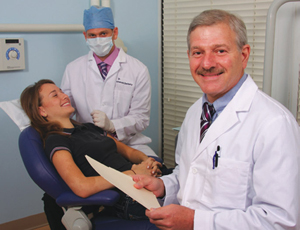Myofascial Pain Disorder Treatment in North Miami Beach, FL
Experience Relief from Myofascial Pain Disorder with Dr. Abbo and Dr. Gallego
Are you struggling with chronic jaw pain, headaches, or limited jaw mobility? Myofascial pain disorder (MPD) of the TMJ can significantly impact your daily life. At Dr. Abbo Advanced Dentistry, our experienced dentist in North Miami Beach, Dr. Abbo and Dr. Gallego, is dedicated to providing effective treatment for MPD. Call (305) 945-0909 to learn more.
Myofascial Pain Disorder: Understanding and Treating Jaw Pain
Myofascial pain disorder (MPD) is a common condition that can cause significant discomfort in the jaw, face, and neck. It occurs when trigger points develop in the muscles, leading to pain, stiffness, and limited range of motion.
Trigger Points of MPD
- Active Trigger Points: These are directly painful and can cause local and referred pain.
- Latent Trigger Points: These are dormant but can become active when pressure or muscle overuse occurs.
Symptoms of MPD
- Referred pain (e.g., shoulder pain radiating to the arm or neck)
- Jaw, face, neck, or shoulder pain or tenderness
- Muscle pain
- Limited jaw movement
- Headaches
- Earaches
- Difficulty chewing or speaking
- Clicking or popping sounds in the jaw
Causes of MPD
- Bruxism: Grinding or clenching teeth
- Jaw Trauma: Injuries to the jaw or face
- Arthritis: Inflammation and damage to the jaw joint
- Poor Posture: Incorrect alignment of the jaw and neck
- Other Factors: Fibromyalgia, chronic fatigue syndrome, chronic pain conditions
Who Can Get MPD?
Anyone can develop MPD, but certain factors may increase the risk:
 History of jaw trauma
History of jaw trauma- Activities that stress the jaw muscles
- Medical conditions like fibromyalgia or chronic fatigue syndrome
- Poor posture
- Bruxism
Your dentist can help you on the road to diagnose myofascial pain syndrome.
Myofascial Pain Syndrome Treatments
- Physical Therapy: Stretching exercises and other physical therapy techniques can help improve the range of motion and alleviate pain in the jaw and surrounding muscles.
- Medications: Over-the-counter pain medications such as ibuprofen or acetaminophen may be recommended to alleviate pain and reduce inflammation. In some cases, Dr. NAME may prescribe medications such as muscle relaxants or antidepressants.
- Trigger Point Injections: These injections typically involve the injection of a local anesthetic or corticosteroid directly into the affected muscle.
- Dental Devices: In some cases, a splint or mouthguard can help alleviate symptoms of bruxism (teeth grinding) and reduce stress on the jaw and facial muscles.
- Surgery: In severe cases of myofascial pain, Dr. NAME may recommend surgery to alleviate pain and improve jaw function. However, surgery is typically only recommended after other treatment options have been exhausted.
Frequently Asked Questions
How is MPD diagnosed?
A healthcare provider will conduct a physical exam, review your medical history, and may order imaging tests.
Can MPD be prevented?
While there is no guaranteed way to prevent MPD, maintaining good posture, avoiding teeth grinding, and practicing proper techniques during activities can help reduce the risk.
Can MPD cause permanent damage?
If left untreated, MPD and myofascial trigger points can lead to permanent damage to the jaw joint and surrounding tissues. However, with proper treatment, many patients can avoid long-term complications like muscle injury and muscle tension.
Schedule Your Appointment Today
If you’re experiencing symptoms of myofascial pain syndrome in the TMJ, it’s crucial to speak with a healthcare professional to receive an accurate diagnosis and appropriate treatment. Don’t let pain and discomfort interfere with your daily life.
Call our North Miami Beach office at (305) 945-0909 to schedule a consultation with Dr. Abbo and Dr. Gallego. You can also reach out through our website, where you’ll be put in contact with a helpful staff member.

